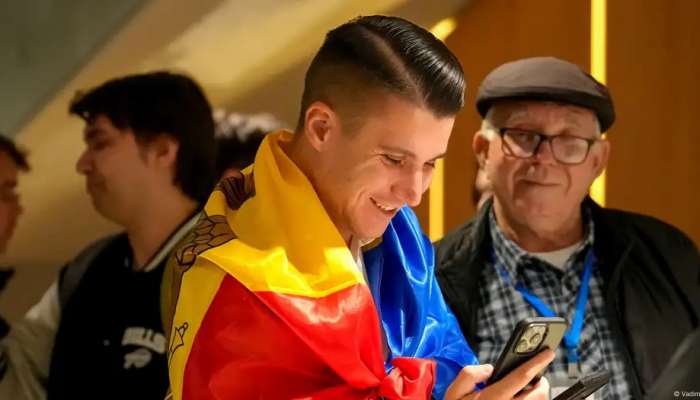
Chisinau: "Russia and Russian influence? No thank you!" This was the clear message sent out by an unexpectedly large majority of voters in Sunday's parliamentary election in the Republic of Moldova.
The winner by a clear margin was the ruling pro-European Action and Solidarity (PAS) party, which contrary to all opinion poll predictions in the run-up to the election, garnered just over 50% of the vote, unexpectedly retaining its absolute majority.
Even though it lost eight seats, it is still likely to have a majority of 55 of the 101 seats in parliament.
The pro-Russian Patriotic Electoral Bloc alliance led by former President Igor Dodon got just 24% of the vote, a result that was much lower than anticipated by many opinion polls.
Other parties that passed the threshold to enter parliament are the nominally neutral, but de facto pro-Russian political alliance known as Alternative, which is led by Mayor of Chisinau, Ion Ceban (approximately 8%), and the party of populist businessman Renato Usatii, Our Party (6%).
In another major surprise that wasn't predicted by any opinion poll or pundit, the right-wing populist Democracy at Home Party (PPDA) got 5.6% of the vote, which means that it, too, will be represented in parliament.
PPDA is in favour of a reunification of Moldova and Romania and is allied with the far-right Romanian party Alliance for the Union of Romanians (AUR), whose leader, George Simion, is barred from entering Moldova.
Victory not down to the diaspora vote alone
Once all votes had been counted, it became clear that PAS had not only received a significant majority of the votes cast by the Moldovan diaspora in western Europe (about 80,000 people), but also the majority of votes cast in three-quarters of all constituencies at home.
The Patriotic Electoral Bloc only came first in the traditionally pro-Russian north of the country, in the autonomous region of Gagauzia and among the relatively small number of voters from the separatist region of Transnistria.
This means that the election result is first and foremost a major defeat for Russia and the Kremlin, which had invested heavily in a pro-Russian campaign.
Igor Grosu, who is both leader of PAS and parliamentary speaker, said on Monday morning: "Moldova, I salute you. You have won battle upon battle against enemies of this country, who seemed invincible. Russia threw everything dirty it had into the fight. Tons of money, lies, illegalities."
Grosu described the election outcome as a clear message that "we decide what happens in this country, not Russia," adding that "it's not only PAS that won the elections, the people won."
One of PAS's most popular and senior candidates, Radu Marian, posted on Facebook: "Moldova 3, Putin 0 — Congratulations to the Moldovans!"
This was an allusion to the outcome not only of Sunday's parliamentary election, but also of the presidential election last November, which saw pro-European President, Maia Sandu, being re-elected, and of the EU referendum that was held on the same day, in which a slim majority voted in favor of the country's aim of joining the European Union.
In recent weeks and months, Moldova has been flooded with pro-Russian content on social media. Most of these were shared by the Patriotic Electoral Bloc, with many also being posted from unknown accounts.
In addition, fugitive Moldovan-Israeli businessman Ilan Shor, who has been convicted of stealing a billion dollars from the country's banking system, also organized an extensive campaign of vote-buying from his home in Moscow.
Training people to cause unrest
Again and again in recent weeks, coordinators of Shor's network have been arrested — most recently last week in the course of a major raid across the country in which large amounts of cash, propaganda material, fake ballots and weapons were seized.
The Moldovan and Serbian police forces also arrested people taking part in training camps in Serbia, where Moldovan and Romanian citizens were being trained in how to stage unrest in the run-up to the election.
Moldova's electoral commission also barred several pro-Russian parties from taking part in the election on the grounds of illegal campaign and party financing.
Two parties were barred only two days before the election, one of which was the pro-Russian Heart of Moldova (IM) party of Irina Vlah, a former governor of the autonomous region of Gagauzia, whose political leaders have close ties to the Kremlin.
Moldovan President Maia Sandu spoke to voters in an uncharacteristically emotional way after casting her vote on Sunday, among other things posting a video on Facebook in which she said: "Russia is not our friend. It attacked a neighboring country without any reason, it turned off the gas taps for us and it wants to buy our votes and our country."
She later wrote on Facebook that "Moldova is our country, not that of Shor's criminal group."
The leader of the Patriotic Electoral Bloc alliance, Igor Dodon, declared late on Sunday that PAS had lost the election and called for protests on Monday to defend the "victory of the people over PAS."
By Monday midday, Dodon had made no further comment on the election result. Given that the outcome of the election was unexpectedly clear, observers do not expect any major protests or unrest in the coming days.
Mayor of Chisinau Ion Ceban simply wrote on Facebook: "We thank everyone. We respect the vote of the citizens!"
Speaking at a press conference, PAS leader and parliamentary speaker Igor Grosu defended the opposition's right to protest in public. He did, however, call on the Patriotic Electoral Bloc and fellow lawmaker Igor Dodon to protest peacefully and not to pay people to protest — something that has happened repeatedly in the past.